
MMS NEWS AND ANNOUNCEMENTS
2017 Interim Meeting Special Edition
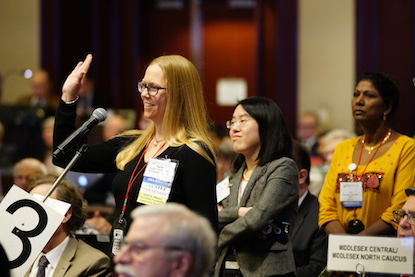
Vital Signs This Week: Special Edition at a glance
Did you miss the 2017 Interim Meeting of the MMS House of Delegates? Or are you looking to relive it? Here's the news from the meeting, with photos, tweets, and members' on-the-spot reviews.
- Announcement: Big news for the 2018 Annual Meeting
- Resolutions: An update on what the MMS stands for
- Annual Oration: Heads up on concussion
- Ethics Forum: Pros and risks of gene tweaks
- Research Poster Symposium: Winning presentations
- Roundup: Photos and tweets
Announcement: Bill Gates to address MMS in April
.JPG)
Bill Gates to speak at 2018 Annual Education Program
Mr. Bill Gates, Co-Chair of the Bill & Melinda Gates Foundation, will deliver the 2018 Shattuck Lecture concurrent with the MMS Annual Meeting, the president of the MMS, Dr. Henry Dorkin, announced Friday. The annual Shattuck Lecture is arranged by the NEJM Editor-in-Chief, Dr.
Jeffrey Drazen; in 2018, it will be incorporated into the MMS annual education program. The 2018 program will focus on global health, with an emphasis on epidemics. Stay tuned in the coming months for more information on the program and registration.
Resolutions: An update on what MMS stands for

Jessica Fortin, student at UMass Medical School and MMS Trustee, testifying
The MMS becomes neutral on medical aid-in-dying
The
House of Delegates voted to adopt the position of neutral engagement on medical aid–in-dying (physician-assisted suicide), the act of a physician writing a prescription for a lethal dose of medication to be used by an adult with a terminal illness at such time as the patient sees fit.
Neutral engagement allows the organization to serve as a medical and scientific resource as part of legislative efforts that will support shared decision making between terminally ill patients and their trusted physicians;
more information. The Society rescinded its longstanding opposition to physician assisted suicide. The policy shift was covered by multiple media outlets, including the Boston Globe and
WBUR.
"I loved Reference Committee A, the discussion on medical-aid-in-dying. It’s so incredible to see people really passionate, even if I disagree. It’s nice to be able to talk to experienced, respectful people about difficult topics—and I learn a lot. For me the meeting overall was about
getting together with students and residents and being able to strategize. It’s very social. A lot of friendships are made there.”
—Jessica Fortin, student and MMS Trustee
"What struck me about the Massachusetts Medical Society meeting in particular was the way the delegates exhibited a shared sense of purpose, collegiality, and professionalism. This was most apparent in the physician aid-in-dying debate. Once it was clear that existing policy
was being rescinded, all delegates worked together to develop the best possible policy for MMS moving forward, regardless of their personal views on the matter."
—Michael Sinha, MD, JD, MPH, delegate, Suffolk County
.JPG)
Members testified on more than 20 proposed resolutions
Additional resolutions
The House of Delegates adopted
additional resolutions, some with major public health implications. These included resolutions relating to:
- Medical parole for incapacitated and terminally ill inmates;
- Naloxone training for medical professional students;
- Family leave for early child care;
- Permitting Massachusetts physicians to dispense prescription medications;
- Unbundling contraceptive procedures from the delivery global payment;
- Prescription availability for weekend discharges.
Find out how the
House of Delegates voted on all the proposed resolutions (member access only).
Annual Oration:
TBI, Concussion, and American Football
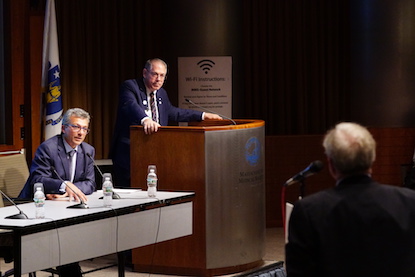
Dr. Alvaro Pascual-Leone (left), Annual Orator, and Dr. Henry Dorkin, MMS president
What football players can teach us about head injury
The
2017 Annual Oration, a continuing education event in a tradition reaching back to 1804, focused on traumatic brain injury and concussions. Alvaro Pascual-Leone, MD, PhD, delivered insights from the Football Players Health Study at Harvard University, exploring the complex and interrelated biological
pathways that underlie the development of player-related illnesses and disability. Dr. Pascual-Leone is professor of neurology and associate dean for clinical and translational research at Harvard Medical School; chief of the Division of Cognitive Neurology and director of the
Berenson-Allen Center for Noninvasive Brain Stimulation at Beth Israel Deaconess Medical Center; and director of the Football Players Health Study.
“As an undergraduate I wrote a term paper about concussions in football players. Dr. Alvaro Pascual-Leone focused on all aspects of football players’ lives — social, legal, economic — and the prognoses of living players, in contrast to many other studies. He compared the spectrum of
contact and noncontact sports; despite our national conversation about football, wrestling actually has the highest incidence of head injuries. As an avid soccer fan, he also had some fun comparing football (soccer) and American football in terms of technique and the prevalence of head
injuries. It was a great lecture about a very timely issue.”
—Jeffrey Breton, student, Tufts University School of Medicine
Ethics Forum: Gene manipulation
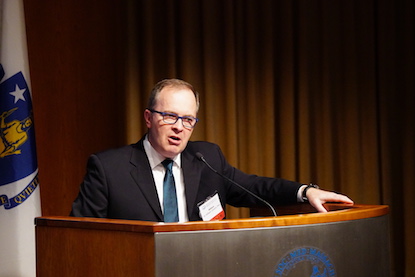
William Lensch, PhD, spoke on the potential and ethics of genetic manipulation
What we can do (and should not do) with human genes
The
2017 Ethics Forum presented CRISPR and the Ethics of Germline Manipulation, a discussion of an experimental biomedical technique in which scientists are able to alter DNA, potentially reversing and eradicating congenital diseases. M. William Lensch, PhD, chief of staff at
Harvard Medical School, explored the potential benefits of human germline manipulation, and related ethical issues ("designer babies" and mistakes in gene editing).
“This was one of the best ethics lectures ever; I’ve been coming to these for ten years. The speaker was very eloquent, engaging, and humorous, and the topic very apropos. We learned that you can do CRISPR in your garage, but you need good equipment—so we don’t have to worry
that monsters will be appearing any time soon.”
—Ana-Cristina Vasilescu, MD, delegate and former president of the Middlesex district
Research Poster Symposium
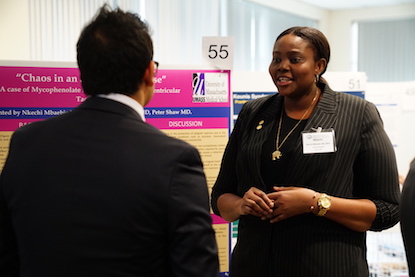
Nkechi Chiugo Mbaebie, MD, MPH, won first place in the clinical vignette category
12th Annual Research Poster Symposium
This year's symposium attracted 50 entries from residents, fellows, and medical students. In our
3-minute video, three presenters describe their projects. "I have come to expect a high level of scientific rigor and excellent presentations," said Fatima Cody Stanford, MD, MPH, a judge. "The diversity of institutions and research represented speaks volumes to the interest in scientific
inquiry within the MA medical community." Congratulations to our many awardees, including the first prize winners in four categories:
- Basic research: Mohammad Almeqdadi MD; St. Elizabeth’s Medical Center and The David H. Koch Institute for Integrative Cancer Research at MIT;
- Clinical research; William L. Hwang, MD, PhD; MGH/HMS;
- Health policy/medical education: Travis R. Hallett, BA; BU School of Medicine;
- Clinical Vignette: Nkechi Chiugo Mbaebie, MD, MPH; Berkshire Medical Center Internal Medicine.
"The quality never ceases to impress me. I applaud the Massachusetts Medical Society for engaging and empowering our physicians-in-training." —Kristina Dzara, PhD, judge (health policy/medical education)
Roundup: Interim Meeting in photos
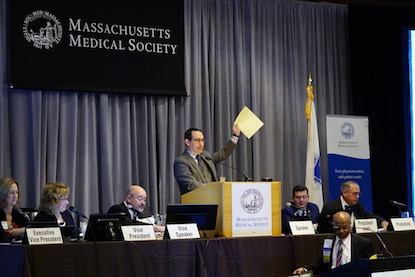
David A. Rosman, MD, MBA, speaker of the House of Delegates (center)
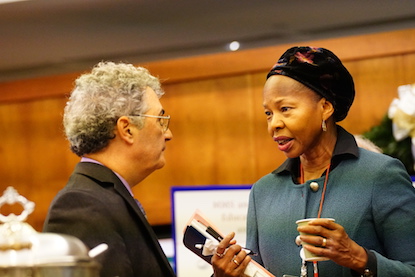
Catching up with Dr. Alice Coombs, past president of the MMS
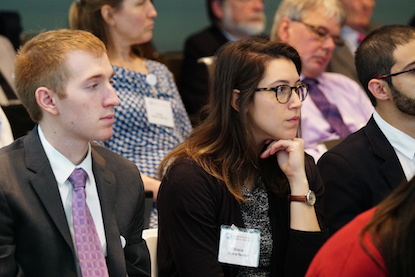
MMS members at a Reference Committee hearing

Practising wound care at the Stop the Bleed exhibit
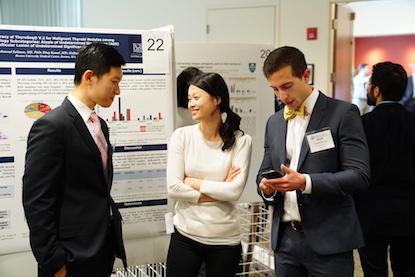
Downtime at the Poster Symposium
